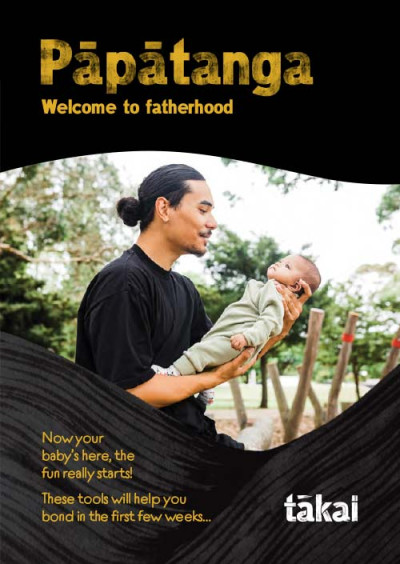
Adolescent dads
Understanding and supporting adolescent dads.
By Hilary Nobilo, Brainwave Trust Aotearoa
Becoming a parent can be an exciting time for young dads, and may also be a time of upheaval. Dads may feel excited and happy at times, and at other times, anxious and scared in much the same way as young mums can be feeling.[i] Because dads aren’t the ones carrying the baby, their transition to parenthood can lack the structure and understanding that guides mothers through a pregnancy. This may result in a new dad’s needs being overlooked.[ii]
The development of adolescent males
Rangatahi go through many changes as they work to achieve the developmental tasks that help them become responsible, well-adjusted adults (See ‘Adolescent social and emotional changes’ ). Becoming an adolescent dad requires additional changes in a young man’s life. This stage of development can become more complicated for rangatahi who are also taking on the role of a dad. They might also be juggling the demands of school, training or work. They might be adjusting to expectations from others and their own identity issues while they’re also getting used to the idea of becoming a parent[iii] (see ‘Adolescent social and emotional changes’ ).
The adolescent brain continues to mature into a person’s 20s. While the female brain matures in the early 20s, the male brain tends to mature later, around the mid-20s.[iv] For example, a 17-year-old mum is likely to be more mature than a 17-year-old dad. The young dad may find it harder to cope with his feelings. He may be more sensitive or more reactive than his 17-year-old partner, and may need more support with making decisions and thinking situations through (See ‘Adolescent social and emotional changes’).
The important role of dads
Dads who are stable and involved have an important role in supporting the wellbeing of their pēpi and tamariki. They will often parent in different ways to mothers. A young child who can experience both types of parenting, in positive ways, is off to a great start in life.
Mums tend to spend more time than dads taking care of their little ones, doing the feeding, bathing, cuddling and soothing.[v] While dads can easily be involved in this care, they’re more often the ones who are having lots of physical play with their pēpi: active play, like holding pēpi up high, bouncing pēpi on their knees, tickling them, and from toddlerhood, playing rough and tumble games and chasing.[vi] With this sort of play, dads are giving their babies and toddlers little challenges and opportunities to take risks and be a bit more daring. Pēpi will develop new skills, learn to co-ordinate and move their bodies, and build the confidence to explore their world. They’re also developing their cognitive skills, which can help them do well at school.[vii] Active play with dads can be exciting and stimulating, both physically and emotionally. This can provide opportunities for tamariki to practise managing their emotions, frustrations and impulsive behaviours, such as biting or hitting.[viii]
Dads can make a difference to how their pēpi and tamariki learn language too. Although they tend to spend less time talking than mums may, and use fewer words, they are more likely to use unusual words and talk about different subjects such as cars or sports.[ix] Dads also tend to use more complex speech than mums, which may also help babies and toddlers with their language development.[x]
Teen mums tend to parent better when they have support from a stable and involved partner. They are less likely to become depressed, or if they do, they’re more likely to recover quickly.[xi] They are more likely to care for pēpi in a responsive way.[xii]
There are many positive outcomes for tamariki who have the loving support of their dad. They’re more likely to develop confidence, have better friendships, fewer behavioural problems, do better at school and are less likely to become involved in criminal activity or substance abuse when they’re older.[xiii]
Barriers to dads’ involvement
During pregnancy, most young dads express a desire to be involved in the birth of their baby and to be actively involved in raising their child. However, some young dads talk of feeling ill-prepared to do this.[xiv]
And, not all dads want to be involved in caring for pēpi. Some may be struggling with their own personal issues linked to poverty, substance use or depression. There can also be tension and conflict in the young parents’ relationship, which affects their level of stress, the level of support they have from each other, and whether or not they’re able to continue in a relationship.[xv]
Dad may not live with pēpi for a number of reasons. If he isn’t living in the home there may still be ways he can be encouraged to be involved and build a meaningful relationship with his pēpi, if that’s appropriate.[xvi]
It’s not only mums who may experience depression after the birth of pēpi; some dads also do.[xvii] Without support, this can impact on the dad’s own wellbeing. It can put strain on his relationship with pēpi, leading to parenting difficulties and increasing the risk of poor outcomes for both pēpi and the young dad.[xviii] Dads can also be more reluctant than mums to seek professional help, especially for mental health concerns.[xix] They may need extra support to engage with specialist services.
Dads who experienced early adversity can have complex issues that may prevent them becoming the kind of parent they want to be, or that their pēpi needs.[xx] However, some of these young men will be motivated to change family patterns when they become dads. Many young dads comment that they want to be better fathers than their own fathers were[xxi] (see ‘Early adversity and neuroplasticity’). While wanting to make changes is a good start, those who’ve experienced poor parenting need early and ongoing support to make and sustain the changes.
What helps?
Adults’ assumptions and expectations about young people affect how they behave and how they feel about themselves. Attitudes towards young dads are not always helpful. Recognising and acknowledging a dad’s qualities and strengths is likely to have a positive influence on how he feels about his capabilities.
Strong whānau relationships can provide support and motivation for a young man to meet the responsibilities of being a father.[xxii] When whānau relationships are not working well, support workers may need to become more involved (see ‘Adolescent parents and their relationships with parents and peers’).
Dads who have an understanding of what makes a ‘good’ dad are most likely to be involved in the care of their pēpi.[xxiii] Much of their understanding or lack of understanding will come from their own experiences of being parented.[xxiv]
Parenting programmes and support services can provide helpful information. However, many of these are targeted towards young mums, with few services available that have been planned specifically with young dads in mind.[xxv] Including dads in programmes and services that are relevant to their needs can make a positive difference.[xxvi]
Depression and other mental health concerns are important issues for young dads, and some may benefit from specialist support.
The quality of the relationship between the adolescent parents plays a big part in the level of a young dad’s involvement, the type of relationship he has with pēpi and the way both parents adjust to parenthood.[xxvii] Rangatahi dads who are stable and involved have the potential to support some good outcomes for their tamariki and the young mum. Like all other parents though, they need good support for themselves. When parents’ needs are well met by other adults, they’re in a stronger position to meet the needs of their tamariki. Dads who are uninvolved at the time of birth may well become involved a bit further on and may benefit from support at this time.[xxviii] Once dads are involved, many are likely to stay involved.[xxix]
Summary
- Rangatahi dads who are stable and involved can have a positive influence on the outcomes for their tamariki and the way their partner parents.
- Mums and dads tend to parent in different ways and tamariki can benefit from experiencing both styles of care.
- Strong, supportive whānau relationships can make a positive difference for young dads.
- While all dads need support, those who experienced early adversity themselves or who have mental health concerns may benefit from specialist services.
References
Bellamy, J. L., & Banman, A. (2014). Advancing research in services for adolescent fathers. Psychology of Men and Masculinity, 15(3), 281–283.
Broesch, T., & Bryant, G. A. (2017). Fathers’ infant-directed speech in a small-scale society. Child Development, 89(2), 29–41.
Elkington, E. (2017). The everyday lives of young Māori fathers: An exploratory study. Journal of Indigenous Wellbeing. Te Mauri-Pimatisiwin, 2(3), 3–16.
Fatherhood Institute. (2010). Fatherhood and childhood and families taskforce: A briefing by the Fatherhood Institute. Retrieved from http://www.fatherhoodinstitute.org/search-results/?cx=009647404999052630351:m4cvktlmjea&cof=FORID:10;NB:1&ie=UTF-8&q=fatherhood and childhood and families t(external link)
Fletcher, R., St George, J., & Freeman, E. (2013). Rough and tumble play quality: Theoretical foundations for a new measure of father–child interaction. Early Child Development and Care, 183(6), 746-759.
Flouri, E. (2005). Fathering and child outcomes. Hoboken, NJ: John Wiley and Sons.
Goldberg, W. A., Tan, E., Davis, C. R., & Easterbrooks, A. (2013). What predicts parental involvement by young fathers at psychosocial risk? Fathering, 11(3), 280–291.
Hans, S. L., & Thullen, M. J. (2009). The relational context of adolescent motherhood. In C. H. Zeanah (Ed.), Handbook of Infant Mental Health (3rd ed., pp. 214–230). New York, NY: The Guilford Press.
Lewin, A., Mitchell, S. J., Waters, D., Hodgkinson, S., Southammakosane, C., & Gilmore, J. (2014). The protective effects of father involvement for infants of teen mothers with depressive symptoms. Maternal and Child Health Journal, 18, 6.
Meece, D., & Robinson, C. M. (2014). Father–child interaction: Associations with self-control and aggression among 4.5-year-olds. Early Child Development and Care, 184(5), 783–794.
Ministry of Social Development. (2010). Supporting teen fathers. A resource for service providers. Retrieved from https://www.msd.govt.nz/documents/about-msd-and-our-work/publications-resources/planning-strategy/teen-fathers/teen-fathers.pdf(external link)
Pancsofar, N., & Vernon-Feagans, L. (2006). Mothers’ and fathers’ language input to young children: Contributions to later language development. Journal of Applied Developmental Psychology, 27, 571–587.
Price-Robertson, P. (2015). Fatherhood and mental illness. A review of key issues. Retrieved from https://aifs.gov.au/cfca/sites/default/files/publication-documents/cfca-paper30.pdf(external link)
Sethna, V., Perry, E., Domoney, J., Iles, J., Psychogiou, L., Rowbotham, N. E., . . . Ramchandani, P. G. (2017). Father–child interactions at 3 months and 24 months: Contributions to children’s cognitive development at 24 months. Infant Mental Health Journal, 38(3), 378–390.
Steinberg, L. (2016). Adolescence (11th ed.). New York, NY: McGraw-Hill Education.
End notes
[i] Price-Robertson, 2015
[ii] Price-Robertson, 2015
[iii] National Fatherhood Initiative, 2015
[iv] Steinberg, 2016
[v] Meece & Robertson, 2014
[vi] Meece & Robertson, 2014
[vii] Sethna et al., 2017
[viii] Peterson & Flanders, 2015, cited by Fletcher et al., 2013
[ix] Pancsofar & Vernon-Feagans, 2006
[x] Broesch & Bryant, 2017
[xi] Lewin et al., 2014
[xii] Hans & Thullen, 2009
[xiii] Flouri, 2005
[xiv] Wilkes et al., 2001, cited by National Fatherhood Initiative, 2015
[xv] Hans & Thullen, 2009
[xvi] Ministry of Social Development, 2010
[xvii] Price-Robertson, 2015
[xviii] Connell & Goodman, 2002, cited by Price-Robertson, 2015
[xix] Galdas et al., cited by Price-Robertson, 2015
[xx] Ministry of Social Development, 2010
[xxi] National Fatherhood Initiative, 2015
[xxii] Elkington, 2017
[xxiii] Goldberg et al., 2013
[xxiv] Australian Childhood Foundation 2012
[xxv] Bellamy & Bandman, 2014
[xxvi] Goldberg et al., 2013
[xxvii] Goldberg et al., 2013
[xxviii] Fisher et al, 2016, cited by Fatherhood Institute, 2010
[xxix] Flouri, 2005














